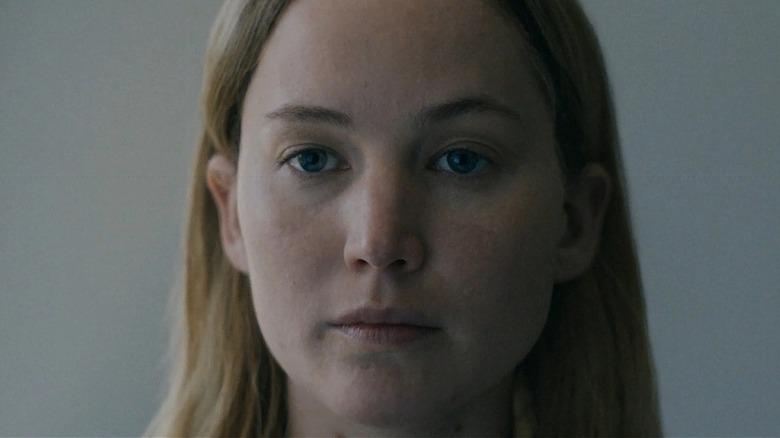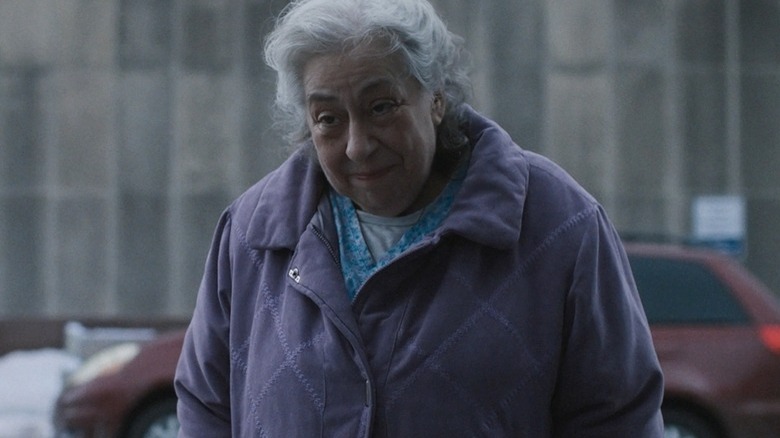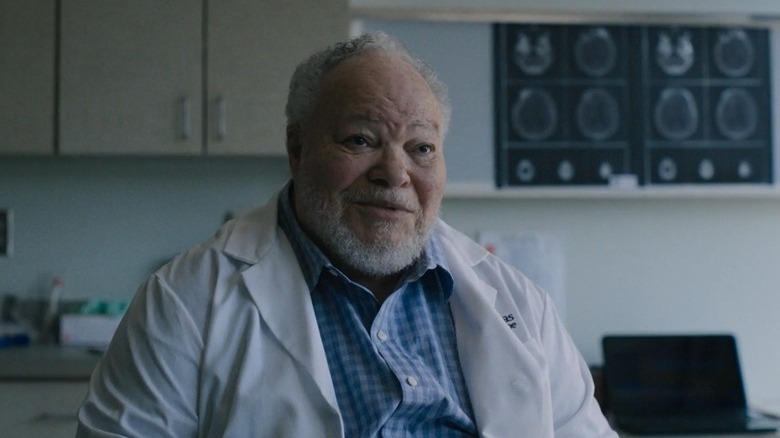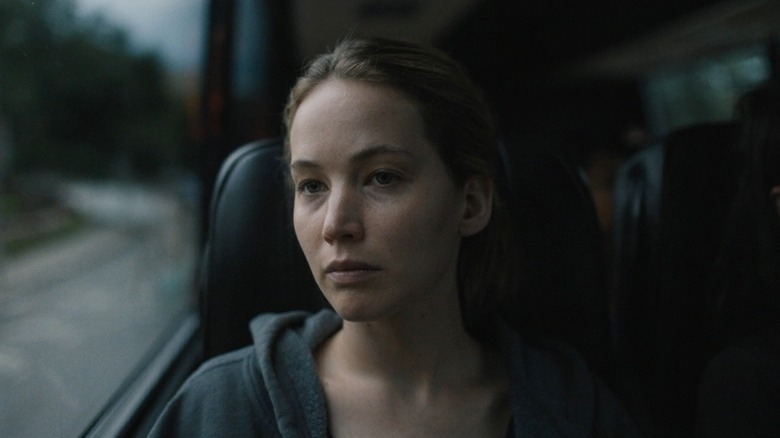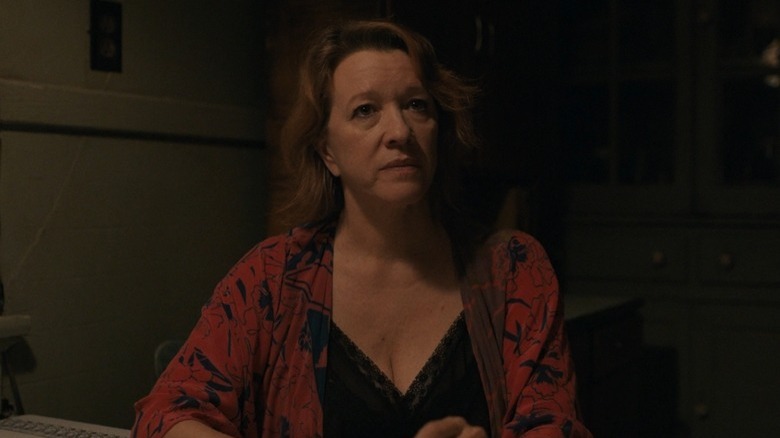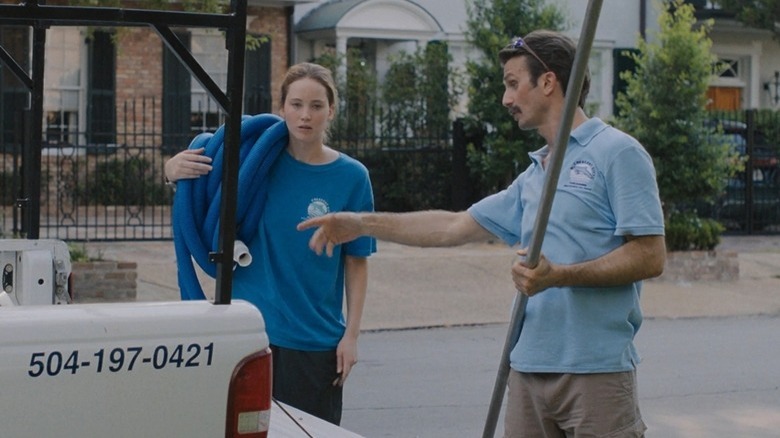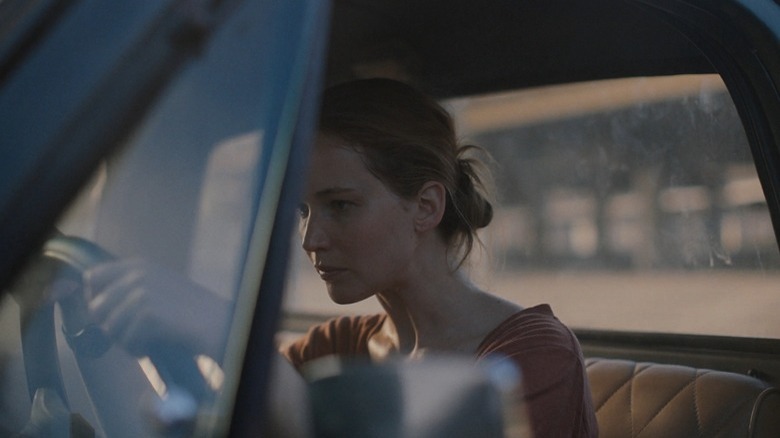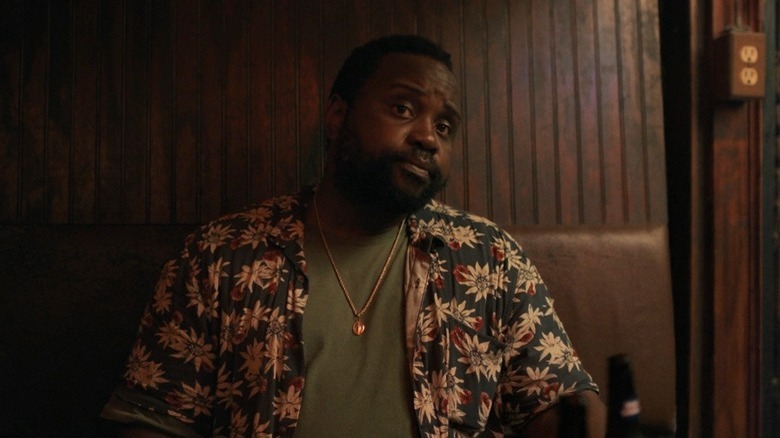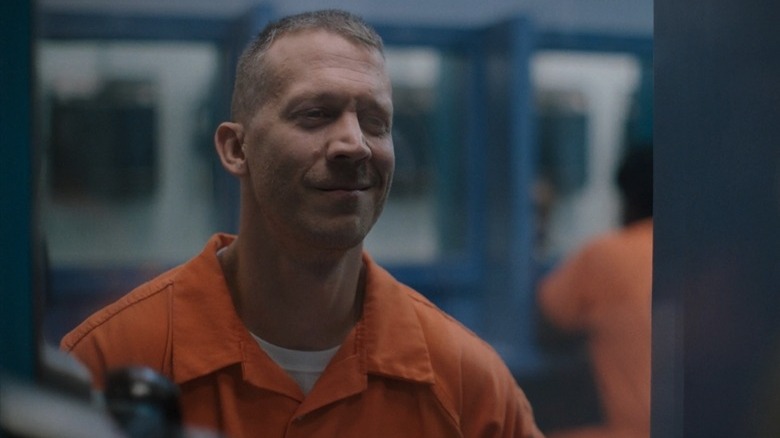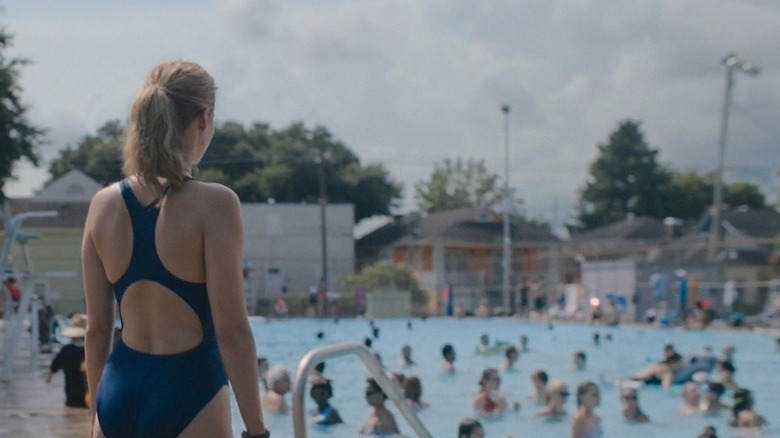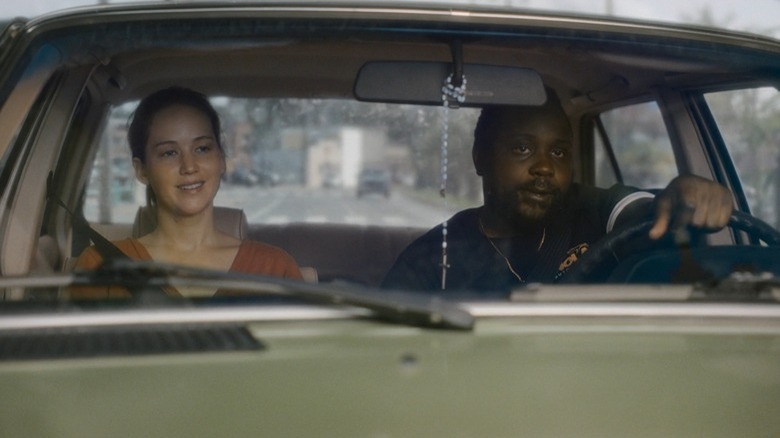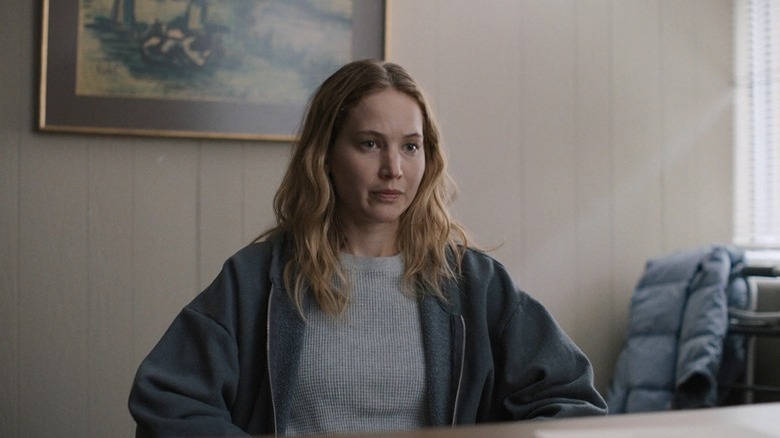The Ending Of Causeway Explained
Director Lila Neugebauer's feature debut "Causeway" charts a veteran's recovery from a traumatic brain injury. Set just months after Lynsey (Jennifer Lawrence) barely survived an IED attack in Afghanistan, the script (written by Ottessa Moshfegh, Luke Goebel, and Elizabeth Sanders) begins with her release of the injured veteran into the care of a nurse named Sharon (Jayne Houdyshell). While she survived the explosion, Lynsey is still struggling, in a very real way, to be herself. She can't command her limbs with any degree of reliability thanks to a brain bleed. Her emotional regulation and communication skills are shredded. At first glance, she appears noncommunicative, almost locked in.
In time, however, Lynsey begins to recover. Soon she can run, drive, lift and carry objects, and do most other physical tasks without issue. She once again correctly interprets emotional stimuli and reacts appropriately to them. While she must maintain a medication regime and continue to work on her rehabilitation, her time with Sharon has ended. Despite her obvious hesitance, it's time for her to return to her childhood home in New Orleans.
There Lynsey quickly encounters much of the baggage she joined the military to escape: an unreliable mom (Linda Emond), a vague but tragic history with her brother Justin (Russell Harvard, best known as Daniel Plainview's rejected son in "There Will Be Blood"), and a pervasive sense of not belonging. James (Brian Tyree Henry), a kind mechanic with his own lingering physical wounds and deep family strife, proves a lone bright spot.
Working to return to the military as soon as possible, Lynsey risks undoing all her recovery to escape Louisiana once more.
Sharon's a stepping stone
Like many physical and mental health care workers, Sharon is an invaluable resource on Lynsey's road to recovery. In addition to providing the wounded veteran transportation, shelter, food, and life skills coaching, the nurse provides a quiet, nonjudgmental sanctuary from the world.
When overwhelmed by a nightmare or traumatic flashback, Lynsey finds Sharon ready. The nurse calms the wounded veteran, comforts her as she vomits, and grounds her in the present with an assisted shower. When Lynsey thoughtlessly comments that Sharon's life sounds terrible, the nurse doesn't even flinch, immediately forgiving the struggling patient's inappropriate outburst.
Also, like many physical and mental health care workers people will encounter, the moment Lynsey has progressed enough to move on, she leaves behind Sharon for good. The audience — and Lynsey herself — never see or hear from Sharon again. "Causeway" never comments on this. The film neither lingers on their last moment together nor mourns it.
This relatively uncommented on transition serves two purposes. First, it speaks to what will be Lynsey's most prominent struggle for the rest of the film — to create emotionally healthy relationships in the present, not just fixate on "escaping" back to active duty. Second, it models how small triumphs and tragedies usually go hand-in-hand in recovery. Lynsey has gained back so much during her time with Sharon, but, as a result, she can no longer keep this woman who was so tremendously, but briefly, important in her life.
Dr. Lucas' concerns
While Lynsey struggles with several interpersonal relationships in "Causeway," she tends to view Dr. Lucas (Stephen McKinley Henderson) as the biggest barrier between her and her goals. She is approaching her time with the doctor as a task to be crossed off. In her view, her recovery is complete. She only needs him to take her off her medications and sign the piece of paper granting her clearance to re-enlist. Given all she has already overcome, and her distaste for all the memories her hometown conjures, she believes that it should be a quick and easy transactional relationship.
Alas, Dr. Lucas disagrees. While he affirms her physical improvements, he repeatedly returns to the psychological and emotional wounds she'd rather not address. Their regular encounters take on a rhythm. Dr. Lucas asks questions, and Lynsey responds largely honestly while attempting to divert focus onto task-oriented questions over psychological ones. Dr. Lucas calls attention to this and refuses her request once again.
In their final encounter, however, Lynsey finally allows herself vulnerability. After referring to his earlier comments about the need to process trauma, Lynsey admits she's well aware that she has unresolved psychological wounds but asserts they're the kind that has nothing to do with being nearly killed in Afghanistan. With this moment of truth between them, he finally relents. However, before she departs, he asks her to consider that just because she can go back doesn't necessarily make it the best choice.
Now that that's done...there's just everything else
Without one goal to focus on — convincing Dr. Lucas to allow her to re-enlist — Lynsey seems to experience a quiet epiphany. In the typically unsentimental, unshowy manner of "Causeway," viewers don't so much witness this revelation as notice its aftermath. Rather than pack a bag and get back to work, Lynsey begins to crisscross her hometown and the surrounding environs to finally address some of those unresolved traumas she hinted at with the Doctor.
While never outright stated, it is easy to infer that once Lynsey had what she thought she wanted and needed, she was suddenly able to her assess her situation with clearer eyes. Once she could take that critical step back and look at her life without the overwhelming need to "prove" herself to Dr. Lucas, things looked different. While her impulse still pushed her to escape New Orleans, her mom's home, and all the unpleasant memories, another part of her could see past that trauma-informed desire. She still might want to re-enlist — perhaps even soon — but for maybe the first time, she can finally admit she has work to do on herself and her relationships with others. Until she addresses those aspects of her life, many that preceded the IED attack, she won't be ready to utilize Dr. Lucas' consent form.
Mom remains an open case... and wound
The issue Lynsey has struggled with the longest is her relationship with her mother, Gloria. We first encounter the gulf between them when Lynsey arrives back in her hometown. As she told Sharon before leaving her care, the plan was to arrive by bus. At the depot, her mom would be waiting to bring her home.
Unfortunately, no one is waiting for Lynsey when the bus drops her off. Worse, it soon becomes apparent it isn't just a matter of mom being late. After waiting for some time, Lynsey, still recovering from a TBI that was once so severe she couldn't even brush her own teeth without help, walks and takes city buses across her hometown. All that only to arrive at an empty house with nothing to eat and no room ready for her.
When Gloria finally shows up, she insists she thought Lynsey was arriving later in the week. That snapshot hints at their dynamic: the parentified serious daughter and the often absent (and full of excuses but no apologies) mom.
The two dodge each other most of the movie, finding excuses not to be home or why they can't talk now. Some moments reveal unresolved anger and strife, as when Gloria tells her daughter, "you used to be fun," in a passive-aggressive "I'm just kidding" tone. While a better understanding between them eventually emerges, there is no true reconciliation or catharsis. Still, two acts of service on Lynsey's part hint at a better future.
A job, for now
One act of reconciliation Lynsey performs toward her mom concerns her new job. While in Afghanistan, a large part of her duty involved civil engineering-like work on improving the water supply in the country. While pool cleaning isn't the same kind of work, it seems to hold a similar appeal for her.
One reason, clearly, is she likes that it allows her to support herself without forcing her to interact much with others. After her boss Rick (Fred Weller), shows her the ropes on day one and leaves, we never see her interact with another colleague at any of the sites.
Second, it is a task she can do and do well. After months of struggling to feed herself, redevelop her social skills, drive again, and so on, pool cleaning is an activity she grasps both physically and mentally straight away. That kind of mastery must be a tremendous relief to her.
Finally, she obviously derives some level of comfort from being near or in water. Thus, cleaning pools — and using them — seems to calm and center her. They're a place of refuge.
That's why her final act before leaving her mom's home, cleaning Gloria's long-neglected above-ground pool, has such resonance. It is a gift to her mother, certainly, but it is also an act of exorcism. In cleaning that pool, she is claiming a bit of calm in a place that she has long disliked and distrusted.
A vehicle restored
Another symbolic act of reconciliation between mother and daughter concerns Gloria's old truck. On Lynsey's first full day back in town, she tries to use the truck to get around. Sadly, it appears that Gloria failed to keep up with the vehicle's maintenance. As a result, before long, Lynsey has to guide the truck, smoke billowing from under its hood, to James' mechanic shop.
Lynsey's willingness to get it fixed and pay for it is her first act of truce towards her mother. She doesn't appear to file it as yet another time mom's lack of attention led to something unfortunate for her, even though that would be an accurate assessment. Instead, Lynsey offers to get it fixed and waives off mom's attempts to make an issue of it.
The repair of the truck proves part of another reconciliation as well, one that's a gesture from James to Lynsey. Early in the film's third act, the two experience a rupture in their relationship after a brief but bruising argument. When Lynsey arrives at James' shop to pick up the vehicle, they still have not spoken since that fight. James is either not at the shop or has told his employee to say he isn't. However, he has instructed Lynsey shouldn't be charged for the repairs. It's an act of significant and undeniable kindness that indicates James may not yet be ready to talk, but he is nonetheless open to some kind of future reconciliation.
James' confession
Early in "Causeway," James reveals that he lost his leg just below the knee in a car accident but said little more about it. Over time, the picture begins to fill itself in.
The incident also cost him his relationship with his sister. Previously so close that the siblings bought a house and lived together, raising his sister's son — James' nephew Antoine — they now no longer speak. We soon learn this stems from the fact that while his sister survived the crash unscathed and James lost his leg, the child was killed.
As difficult as this revelation is, it is also clear there's something deeper that James is still holding back. Late one night, as Lynsey and James swap stories over beers and cannabis, the deeper secret comes out. Lynsey gently prods him, asking small neutral questions, but mostly stays in the moment with him. Eventually, James fills in more blanks. His nephew wanted to ride up front, which James' sister thought was a bad idea. But James was the cool uncle and figured it was such a short drive home. Then the accident happened. Had the boy ridden home in the back, he likely would've survived, too.
While initially a moment of vulnerability that brings Lynsey and James closer than ever, the confession leads to an ill-advised kiss and an accidentally cruel comment from Lynsey. It escalates into a full-fledged nasty fight that drives a wedge between them.
The truth about Lynsey's brother
One aspect of James and Lynsey's argument centers around her brother Justin. Throughout "Causeway," he's referenced but never in a way that makes what happened to him or where he is clear. The first time, Sharon asks if Justin might be a backup if mom is unavailable to pick Lynsey up. She, however, refuses to answer Sharon's specific question, instead opting to restate her plan.
Later, James points out that Lynsey only speaks of her brother in the past tense, leading him to believe Justin must be dead. Lynsey, however, vehemently denies this while still not explaining where her brother is or what he's involved with in the present.
In the film's final act, the truth about Justin is finally laid bare. As spoken about earlier, he was an addict. Either arrested for using, what he did while high, or what he did to get the money to get high, he's now in prison. In fact, he's been serving time nearly as long as Lynsey's been away from Louisiana. As part of her tour of addressing past unresolved traumas, she finally visits him.
Speaking to one another through American Sign Language — both Justin, the character, and Russell Harvard, the actor, are deaf — the two reconnect in a surprisingly gentle, anger-free conversation. Whatever resentments she conveyed earlier seem to melt away upon seeing him again. Meanwhile, Justin admits prison is the safest place for him, expressing nothing but love and concern for his little sister.
If you or anyone you know needs help with addiction issues, help is available. Visit the Substance Abuse and Mental Health Services Administration website or contact SAMHSA's National Helpline at 1-800-662-HELP (4357).
Rejoining humanity
As demonstrated repeatedly, one big hurdle Lynsey refused to acknowledge but nonetheless was obviously struggling with was interacting with others. While she seemed to be able to negotiate while talking to her boss or her doctor, going to buy groceries, and so on, it's clear she lives her life to minimize social contact with others. She was isolated from most of the world. As previously noted, a big upside of cleaning pools was being able to work largely without interactions with homeowners or coworkers. She dodged most of her mom's attempts to spend time together. She didn't seek out old friends. She didn't try to date. James was the only person who seemed to be allowed past her defenses.
A sign that she same be finally trying to shed her cloak of isolation comes with a trip to the local public pool. After a few months of swimming by herself in other people's private pools, just showing up at a busy public pool is a big step.
Lynsey doesn't stop there, though. After observing the throngs of people for several moments, she walks to the pool. She descends the stairs. Then, she ducks under the water, emerging several feet forward, genuinely surrounded by strangers, part of the crowd for perhaps the first time since the IED attack. It's her most significant step yet towards no longer hiding away.
Lynsey and James finally talk
After addressing her family issues and her self-imposed exile to some degrees, Lynsey still has not spoken to James. While Dr. Lucas' clearance inspires her to reassess her goals, that epiphany happens after her and James' argument has ruptured their relationship. As a result, he still has no idea that she has decided not to leave New Orleans to re-enlist.
Despite repeatedly calling him, he's never answered, and she's never left a voicemail. When she picks up her truck from James' shop, he isn't there to give her the keys. So, finally, she resorts to going to his house. There she finds him on the front steps, looking in a rough state.
Still emotionally wounded, James is testy and defensive with her. Nonetheless, Lynsey presses forward. First, she apologizes for what she said and did. Next, she reveals she plans to stay in the New Orleans area for the foreseeable future instead of rushing back to the armed services. Finally, she asks if he still wants her to move with him, an offer he made earlier in the film with their friendship was still strife free. While it was James' idea initially, his current feeling about it has obviously grown more complex.
As "Causeway" ends, their ultimate reconciliation remains up in the air. Lynsey is meeting James more than halfway, but it is also clear that he's still struggling to move past the things she said to him in the heat of their argument.
The director's perspective
In describing the film to Metro Philadelphia, director Lila Neugebauer called it "an intimate look at two lost souls finding connection." This suggests that where the film ends is the beginning of the next stage of James and Lynsey's story, that they will find a way past their damaging fight.
The director continued on, confirming how Lynsey's prior self-reliance was so integral to her character that giving it up after the injury, even temporarily, was almost as damaging as the IED attack itself. Moreover, her reaction to that helplessness made her exceptionally resistant to the steps of recovery. "I think she's a person who has fought to be self-reliant and the initial setback that begins the film thrusts her into a position of total dependence."
She elaborated, "I also think she's a willful person... which in some contexts I think manifests as a great strength in terms of determination and tenacity, and in other contexts might manifest as stubbornness and kind of an Achilles for this character."
Neugebauer also reinforced that the film's emphasis on recovery is about holistic improvement, not just the big milestones. She explained, again to the Metro Philadelphia, "recovery, [and] healing of any kind is often measured in small steps or steps that might look small, but in fact are hard fought and take a great deal of resilience."
